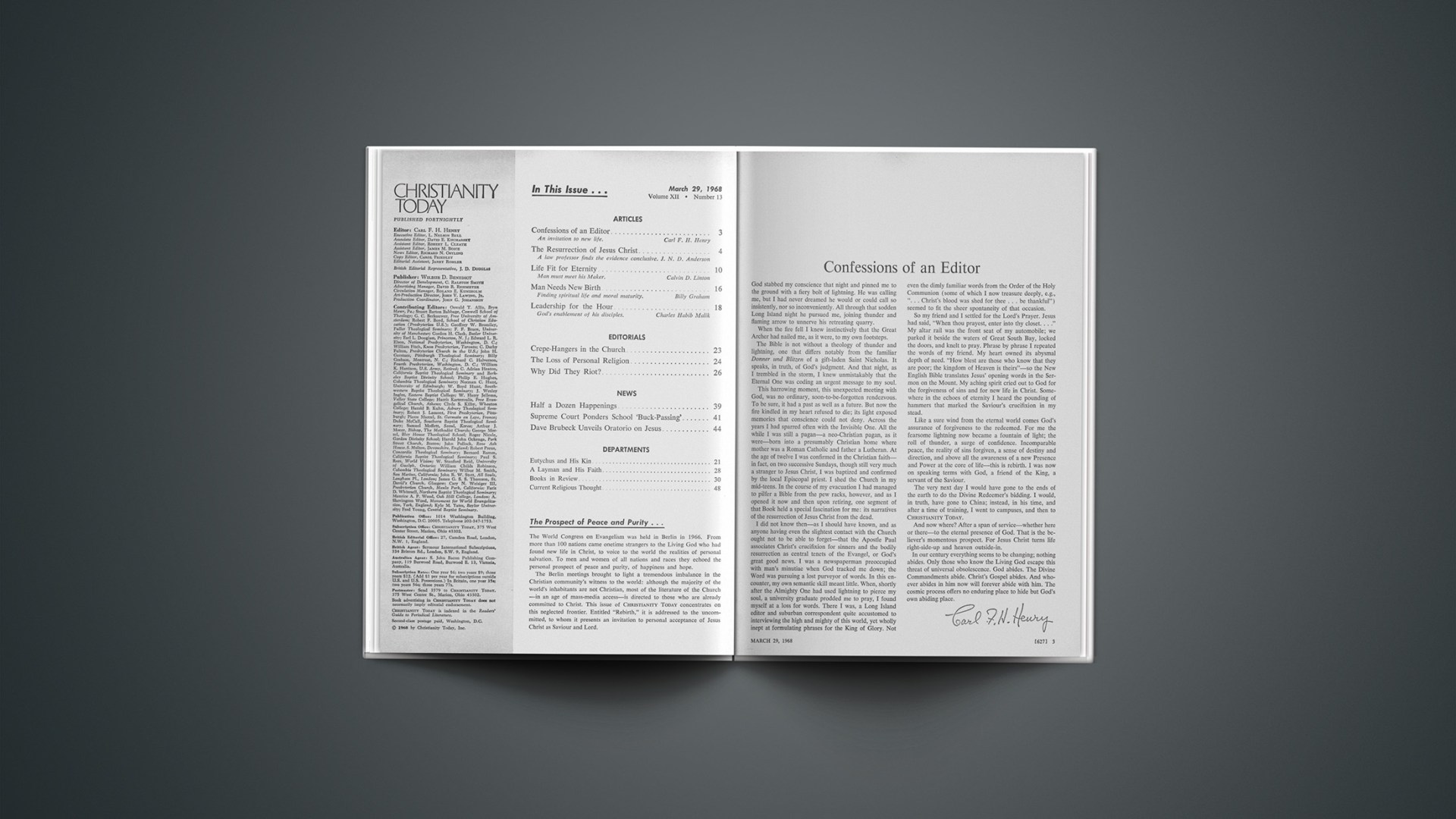God stabbed my conscience that night and pinned me to the ground with a fiery bolt of lightning. He was calling me, but I had never dreamed he would or could call so insistently, nor so inconveniently. All through that sodden Long Island night he pursued me, joining thunder and flaming arrow to unnerve his retreating quarry.
When the fire fell I knew instinctively that the Great Archer had nailed me, as it were, to my own footsteps.
The Bible is not without a theology of thunder and lightning, one that differs notably from the familiar Donner und Blitzen of a gift-laden Saint Nicholas. It speaks, in truth, of God’s judgment. And that night, as I trembled in the storm, I knew unmistakably that the Eternal One was coding an urgent message to my soul.
This harrowing moment, this unexpected meeting with God, was no ordinary, soon-to-be-forgotten rendezvous. To be sure, it had a past as well as a future. But now the fire kindled in my heart refused to die; its light exposed memories that conscience could not deny. Across the years I had sparred often with the Invisible One. All the while I was still a pagan—a neo-Christian pagan, as it were—born into a presumably Christian home where mother was a Roman Catholic and father a Lutheran. At the age of twelve I was confirmed in the Christian faith—in fact, on two successive Sundays, though still very much a stranger to Jesus Christ, I was baptized and confirmed by the local Episcopal priest. I shed the Church in my mid-teens. In the course of my evacuation I had managed to pilfer a Bible from the pew racks, however, and as I opened it now and then upon retiring, one segment of that Book held a special fascination for me: its narratives of the resurrection of Jesus Christ from the dead.
I did not know then—as I should have known, and as anyone having even the slightest contact with the Church ought not to be able to forget—that the Apostle Paul associates Christ’s crucifixion for sinners and the bodily resurrection as central tenets of the Evangel, or God’s great good news. I was a newspaperman preoccupied with man’s minutiae when God tracked me down; the Word was pursuing a lost purveyor of words. In this encounter, my own semantic skill meant little. When, shortly after the Almighty One had used lightning to pierce my soul, a university graduate prodded me to pray, I found myself at a loss for words. There I was, a Long Island editor and suburban correspondent quite accustomed to interviewing the high and mighty of this world, yet wholly inept at formulating phrases for the King of Glory. Not even the dimly familiar words from the Order of the Holy Communion (some of which I now treasure deeply, e.g., “… Christ’s blood was shed for thee … be thankful”) seemed to fit the sheer spontaneity of that occasion.
So my friend and I settled for the Lord’s Prayer. Jesus had said, “When thou prayest, enter into thy closet.…” My altar rail was the front seat of my automobile; we parked it beside the waters of Great South Bay, locked the doors, and knelt to pray. Phrase by phrase I repeated the words of my friend. My heart owned its abysmal depth of need. “How blest are those who know that they are poor; the kingdom of Heaven is theirs”—so the New English Bible translates Jesus’ opening words in the Sermon on the Mount. My aching spirit cried out to God for the forgiveness of sins and for new life in Christ. Somewhere in the echoes of eternity I heard the pounding of hammers that marked the Saviour’s crucifixion in my stead.
Like a sure wind from the eternal world comes God’s assurance of forgiveness to the redeemed. For me the fearsome lightning now became a fountain of light; the roll of thunder, a surge of confidence. Incomparable peace, the reality of sins forgiven, a sense of destiny and direction, and above all the awareness of a new Presence and Power at the core of life—this is rebirth. I was now on speaking terms with God, a friend of the King, a servant of the Saviour.
The very next day I would have gone to the ends of the earth to do the Divine Redeemer’s bidding. I would, in truth, have gone to China; instead, in his time, and after a time of training, I went to campuses, and then to CHRISTIANITY TODAY.
And now where? After a span of service—whether here or there—to the eternal presence of God. That is the believer’s momentous prospect. For Jesus Christ turns life right-side-up and heaven outside-in.
In our century everything seems to be changing; nothing abides. Only those who know the Living God escape this threat of universal obsolescence. God abides. The Divine Commandments abide. Christ’s Gospel abides. And whoever abides in him now will forever abide with him. The cosmic process offers no enduring place to hide but God’s own abiding place.










